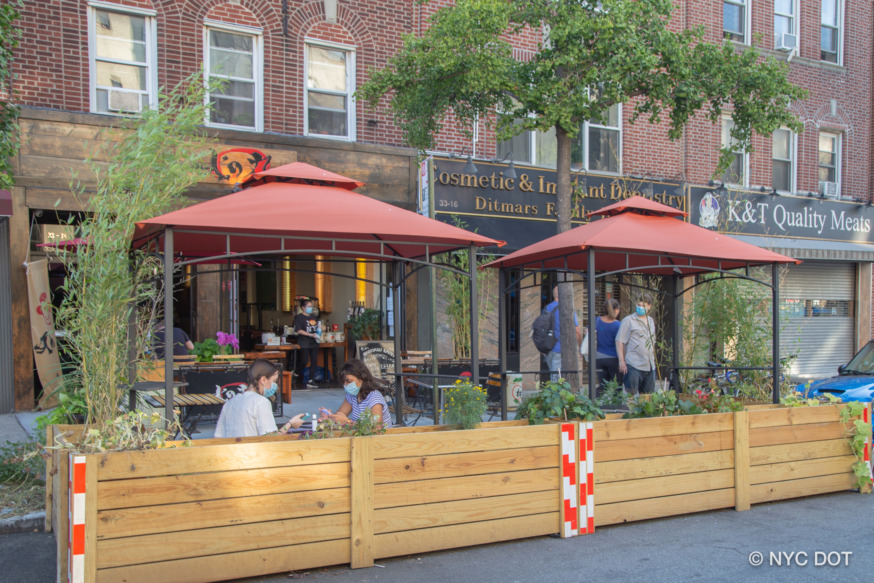
Ditmars Boulevard (NYCDOT)
Sept. 25, 2020 By Allie Griffin
New York City’s popular outdoor dining initiative will now be year-round and permanent, Mayor Bill de Blasio announced today.
The “Open Restaurants” program, where restaurants can set up outdoor dining on sidewalks and streets, will continue into the fall and winter months, de Blasio said.
The “Open Streets: Restaurants” part of the program, in which restaurants can serve patrons at tables on specific roads closed to through traffic, will also be permanent and year-round.
According to city hall estimates, Open Restaurants has enrolled more than 10,300 establishments and has saved roughly 90,000 jobs citywide since it began in June as a response to COVID-19.
The program was originally set to expire at the end of October, but many advocates, business owners and elected officials called on the city to continue it year-round.
De Blasio said the program will be a new tradition for New York City as it recovers from the pandemic.
“Open Restaurants was a big, bold experiment in supporting a vital industry and reimagining our public space. And it worked,” de Blasio said in a statement. “As we begin a long-term recovery, we’re proud to extend and expand this effort to keep New York City the most vibrant city in the world. It’s time for a new tradition.”
The city will also allow restaurants to expand their outdoor seating to the front of adjacent properties, which was previously prohibited. The adjacent property owners must formally agree to the use of the space for a specified period of time at no fee.
The Department of Transportation (DOT) will issue a template agreement and provide further instructions early next month, City Hall said.
Restaurants who choose to continue with outdoor dining can set up heaters and tents to keep diners warm as cooler weather arrives.
Electric heaters will be permitted on both sidewalks and roadways, while propane and natural gas heaters will require a permit from the FDNY and are only allowed on sidewalks. The city will release official guidance on the use of heaters by the end of September, City Hall said. Restaurants cannot install heaters until then.
The city has also set rules for tents. Restaurants can choose to use a partial tent where at least half of the tent’s sides are open or a full tent at 25 percent capacity in line with the indoor dining rules.
Indoor dining in New York City is set to reopen at 25 percent capacity on Sept. 30.
City Hall will work multiple city agencies and the City Council to make the regulatory changes and guidance necessary to make the program permanent, de Blasio said.
Ridgewood Council Member Antonio Reynoso said he looks forward to working with the mayor on legislation to codify the outdoor dining program into law. The City Council is set to hear his bill next Wednesday that would do just that.
“The outdoor dining program has been an unequivocal success for both businesses and the public,” Reynoso said. “Outdoor dining has not only provided a lifeline for restaurants, it has demonstrated how our public streets can be transformed to create the dynamic spaces that make New York City special.”
One Comment

Great its about time that decision was made. Now if he would Resign.
Its always better to leave on a high note.